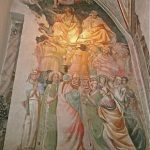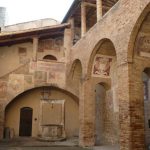James Taylor, Vladimir I. Arnold, John Coetzee, Jacob Bronowski, Kenneth Clark, John Ruskin, Donald Knuth, Tony Judt, Josep Pla, Rudyard Kipling, Eric Hobsbawm, Albert Camus, Robert Hughes, Walter Pater, Giuseppe Verdi, Marc Fumaroli, Johan Huizinga, Caritas italiana, Gilbert K. Chesterton, Nuccio Ordine, Paul Simon, Piers, Jubal E. Harshaw, Julian Barnes/Shostakóvich, Andrei Toom, Peter F. Drucker, John Ruskin, Naftalí Hertz Mussman, Aldous Huxley, June Huh.
SECRET O’ LIFE
(James Taylor)
‘Cause anyone knows…
… we’re only here for a while
Might aswell show some style
Give us a smile.
MATHEMATICS & PHYSICS
(Vladimir I. Arnold)
Mathematics is a part of physics. Physics is an experimental science, a part of natural science. Mathematics is the part of physics where experiments are cheap.
LO QUE ESTÁS ENSEÑANDO TE DEBE IMPORTAR
(John Coetzee)
Según mi experiencia, los alumnos pronto descubren si lo que les estás enseñando te importa. En caso afirmativo están dispuestos a considerar la posibilidad de que también les importe a ellos. Pero si llegan a la conclusión, acertada o no, de que no te importa, no hay nada que hacer, sería mejor que te fueras a casa.
THAT’S REALLY CRUCIAL TODAY
(Jacob Bronowski)
And yet, 50 years from now, if an understanding of man’s origins, his evolution, his history, his progress, is not the commonplace of school notebooks, we shall not exist. And I’m infinitely saddened to find myself suddenly surrounded in the West by a sense of a terrible loss of nerve, a retreat from knowledge into- into what? Into profound questions… which simply do not lie along the line of what we are now able to know if we devote ourselves to it, an understanding of man himself… at last bringing together the experience of the arts and the explanations of science.
It sounds very pesimistic to talk about Western Civilisation with a sense of retreat. Of course the ascent of man will go on. But don’t assume that it will go on carried by Western Civilisation as we know it. We are being weighed in the balance at this moment. If we give up, the next step will be taken, but not by ours. We have not been given any guarantee that Assyria, and Egypt, and Rome were not given.
We are a scientific civilisation in which knowledge and its integrity are crucial. If we don’t take the next step, it will be taken elsewhere. Should I feel that to be sad? No. And yet, wedded as I am to the civilisation that nurtured me, I should feel infinitely sad, I should feel a grave sense of loss, as you would, if 100 years from now Shakespeare and Newton are historical fossiles.
WHAT IS CIVILISATION?
(Kenneth Clark)
I am standing on the Pont des Arts in Paris. On one side of the Seine is the harmonious, reasonable façade of the Institute de France, built as a college in about 1670. On the other bank is the Louvre, built continuously from the Middle Ages to the nineteenth century: classical architecture at its most splendid and assured. Just visible upstream is the catedral of Notre Dame –not perhaps the most lovable of cathedrals, but the most rigorously intellectual façade in the whole Gothic art. The houses that line the banks of the river are also a humane and reasonable solution of what town architecture should be, and in front of them, under the trees, are the open bookstalls where generations of students have found intellectual nourishment and generations of amateurs have indulged in the civilised pastime of book collecting.
What is civilisation? I don’t know. I can’t define it in abstract terms – yet. But I think I can recognise it when I see it; and I am looking at it now.
THE BOOK OF ART
(John Ruskin)
Great nations write their autobiographies in three manuscripts, the book of their deeds, the book of their words, and the book of their art. Not one of these books can be understood unless we read the two others, but of the three the only trustworthy one is the last.
LA TRADICIÓN MATEMÁTICA
(Donald Knuth)
Los matemáticos no patentan nada. Descubren algo, lo publican, y esperan que le guste a alguien.
WE CANNOT GO ON LIVING LIKE THIS
(Tony Judt)
Something is profoundly wrong with the way we live today. For thirty years we have made virtue out of the pursuit of material self-interest: indeed, this very pursuit now constitutes whatever remains of our sense of collective purpose.
The materialistic and selfish quality of contemporary life is not inherent in the human condition. Much of what appears ‘natural’ today dates from the 1980s: the obsession with wealth creation, the cult of privatization and the private sector, the growing disparities of rich and poor. And above all, the rhetoric which accompanies these: uncritical admiration for unfettered markets, disdain for the public sector, the delusion of endless growth.
However, poverty –whether measured by infant mortality, life-expectancy, access to medicine and regular employment or simple inability to purchase basic necessities– has increased steadily since the 1970s in the US, the UK and every country that has modelled its economy upon their example. The pathologies of inequality and poverty –crime, alcoholism, violence and mental illness– have all multiplied commensurately. The social question is back on the agenda.
This comes from Ill fares the land, a highly recommendable reading in this markets idolization era.
ITALIA
(Josep Pla)
Llegar a una ciudad desconocida […] y salir a la calle al azar, a curiosear y a hacer de franco forastero, […] una de las prácticas más agradables de la vida. En Italia, el método puede aplicarse sin riesgo de perder el tiempo, porque la cantidad de maravillas que contiene, en los lugares más insospechados y recónditos, es formidable.
Italia […] es un pais que colma todas las inclinaciones de la sensibilidad humana.
Mientras el mundo exista el viaje a Italia es una de las obras más nobles que el hombre podrá llevar a cabo. Sin el Renacimiento […] no quedaría en Europa, desde el punto de vista del arte, nada que mereciese la pena de hacer las maletas para irlo a ver. De Italia provienen las formas más vivas y bellas que ha producido el espíritu humano.
WORKING-TOOLS
(Rudyard Kipling)
[A series of Anglo-Indian tales] were originally much longer than when they appeared, but the shortening of them, first to my own fancy after rupturous re-readings, and next to the space available, thaught me that a tale from which pieces have been raked out is like a fire that has been poked. One does not know that the operation has been performed, but everyone feels the effect. Note, though, that the excised stuff must have been honestly written for inclusion.
[Higher Editing] Take a well-ground Indian Ink as much as suffices and a camel-hair brush proportionate to the interspaces of your lines. In an auspicious hour, read your final draft and consider faithfully every paragraph, sentence and word, blacking out where requisite. Let it lie by to drain as long as possible. At the end of that time, reread and you should find that it will bear a second shortening. Finally, read it aloud and at leisure. Maybe a shade more brushwork will then indicate or impose itself.
SELF-EDUCATION OF ACADEMICS
(Eric Hobsbawm)
There is nothing for the self-education of academics like the need to prepare lectures.
SUR LA SOCIÉTÉ DU 1957 (OU 2012?)
(Albert Camus)
Nous vivons dans une société qui n’est même pas la société de l’argent (l’argent ou l’or peuvent susciter des passions charnelles), mais celle des symboles abstraits de l’argent. La société des marchands peux se definir comme une société où les choses disparaissent au profit des signes. Quand une classe dirigeante mesure ses fortunes non plus à l’arpent de terre ni au lingot d’or, mais au nombre de chiffres correspondant idéalement à un certain nombre d’opérations d’échange, elle se voue du même coup à mettre une certaine sorte de mystification au centre de son expérience et son univers. Une société fondée sur des signes est, dans son essence, une société artificielle où la vérité charnelle de l’homme se trouve mystifiée. On ne s’étonnera pas alors que cette société ait choisi, pour en faire sa religion, une morale de principes formels, et qu’elle écrive les mots de liberté et d’égalité aussi bien sur ses prisons que sur ses temples financiers. Cependant, on ne prostitue pas impunément les mots. La valeur la plus calomniée aujourd’hui est certainement la valeur de liberté. De bons sprits (j’ai toujours pensé qu’il y avait deux sortes d’intelligence, l’intelligence intelligente et l’intelligence bête) mettent en doctrine qu’elle n’est rien qu’un obstacle sur le chemin du vrai progrès. Mais des sottises aussi solennelles ont pu être proférées parce que pendant cent ans la société marchande a fait de la liberté un usage exclusif et unilatéral, l’a considérée comme un droit plutôt que comme un devoir et n’a pas craint de placer aussi souvent qu’elle l’a pu une liberté de principe au service d’une oppression de fait.
SUR LA SOCIÉTÉ DU 1957 (OU 2012?)
(Albert Camus)
Nous vivons dans une société qui n’est même pas la société de l’argent (l’argent ou l’or peuvent susciter des passions charnelles), mais celle des symboles abstraits de l’argent. La société des marchands peux se definir comme une société où les choses disparaissent au profit des signes. Quand une classe dirigeante mesure ses fortunes non plus à l’arpent de terre ni au lingot d’or, mais au nombre de chiffres correspondant idéalement à un certain nombre d’opérations d’échange, elle se voue du même coup à mettre une certaine sorte de mystification au centre de son expérience et son univers. Une société fondée sur des signes est, dans son essence, une société artificielle où la vérité charnelle de l’homme se trouve mystifiée. On ne s’étonnera pas alors que cette société ait choisi, pour en faire sa religion, une morale de principes formels, et qu’elle écrive les mots de liberté et d’égalité aussi bien sur ses prisons que sur ses temples financiers. Cependant, on ne prostitue pas impunément les mots. La valeur la plus calomniée aujourd’hui est certainement la valeur de liberté. De bons sprits (j’ai toujours pensé qu’il y avait deux sortes d’intelligence, l’intelligence intelligente et l’intelligence bête) mettent en doctrine qu’elle n’est rien qu’un obstacle sur le chemin du vrai progrès. Mais des sottises aussi solennelles ont pu être proférées parce que pendant cent ans la société marchande a fait de la liberté un usage exclusif et unilatéral, l’a considérée comme un droit plutôt que comme un devoir et n’a pas craint de placer aussi souvent qu’elle l’a pu une liberté de principe au service d’une oppression de fait.
THE FUTURE THAT WAS
(Robert Hughes)
Meanwhile, the fetish of stylistic innovation has been deconstructed, too —though not enough, perhaps, among the cultural bureaucrats of late modernism. We look back on the past and reflect how it has formed the present. But aesthetic value does not rise from the work’s apparent ability to predict a future: we do not admire Cézanne because the Cubists drew on him. Value rises from deep in the work itself— from its vitality, its intrinsic qualities, its address to the senses, intellect, and imagination; from the uses it makes of the concrete body of tradition. In art there is no progress, only fluctuations of intensity. Not even the greatest doctor in Bologna in the seventeenth century knew as much about the human body as today’s third-year medical student. But nobody alive today can draw as well as Rembrandt or Goya.
ON WHAT’S WORTH
(Walter Pater)
Well, we are all condamnés, as Victor Hugo says: les hommes sont tous condamnés a morte avec des sursis indéfinis: we have an interval, and then our place knows us no more. Some spend this interval in listlessness, some in high passions, the wisest in art and song. For our one chance is in expanding that interval, in getting as many pulsations as possible into the given time. High passions give one this quickened sense of life, ecstasy and sorrow of love, political or religious enthusiasm, or the ‘enthusiasm of humanity.’ Only, be sure it is passion, that it does yield you this fruit of a quickened, multiplied consciousness. Of this wisdom, the poetic passion, the desire of beauty, the love of art for art‘s sake has most; for art comes to you professing frankly to give nothing but the highest quality to your moments as they pass, and simply for those moments.
And you can substitute maths for art (maths means pure maths, of course).
PROGRESSO
(Giuseppe Verdi)
Torniamo all’antico e sarà un progresso.
CIVILIZACIÓN Y ARTE
(Marc Fumaroli)
Para mi felicidad y la nuestra, París guarda, casi intacta, la impronta de mil años de talento arquitectónico, urbanístico y artístico, y la calidad de su luz casi marina, sea cual sea la estación, incluso en tiempo lluvioso […]. El gris perla de París es único. Es una ciudad para grabadores, para burilistas y para pastelistas conocedores del arte del dibujo y de los visos del tornasolado. […] París es una persona noble, pero es también una noble morada, cuya distribución generosa y numerosa asocia a cielo abierto las salas, las enfiladas, las galerías, los pasajes, las dependencias más diversas, no obstante maravillosamente acordados entre sí y no simplemente yuxtapuestos, de un teatro urbano acogedor y cómodo, tanto para sus actores como para sus espectadores.
Hay civilización y gente civilizada allí donde unas obras de arte fijan la imaginación y purgan las pasiones representando, para el espíritu, la naturaleza y la naturaleza humana, en unos objetos que duran por sí solos, a distancia del espectador al que ellos miran.
LA RENAISSANCE
(Johan Huizinga)
[L’automne du Moyen Âge] La forme, dans sa luxurience, envahit l’idée ; l’ornement se saisit de toutes les lignes et de toutes les surfaces. C’est un art où règne cette horreur de vide qui est peut-être une charactéristique des cultures à leur déclin.
[El problema del Renacimiento] Pues hay algo que debemos tener siempre presente: el Renacimiento es uno de los grandes triunfos del espíritu latino. Quien quiera comprenderlo deberá ser sensible a esa mezcla de estoica seriedad y determinación (una determinación que no se agota en la noble expresión de la propia personalidad) y de despreocupada alegría; deberá comprender ese temperamento noble y complejo, no exento de ingenuidad.
GUERRE ALLA FINESTRA. Giustizia e diritti humani
(Caritas Italiana)
Il numero minimo [!!!] di morti necessario per sancire come guerra una determinata situazione di conflitto è puntualmente superato dal numero di vittime registrato in periodi caratterizzati da bassa incidenza di eventi bellici, quindi la cosiddetta pace diventa più guerra della stessa guerra.
Assistiamo oggi ad apparenti conflitti culturali o di civiltà dietro cui c’è sempre la lotta per il potere o per le risorse, a guerre dimenticate e imperdonabilemente banalizzate dai media e dalle Istituzioni.
Fame, sete, maladie curabili, spesso a seguito di guerre infinite, costituiscono la peggiore arma di distruzione di massa. La destinazione universali dei benni per la pace: la giustizia implica la lotta alla povertà e porta a la pace.
È fondamentale ricercare le cause che generano un conflitto armato, anziatutto quelle collegate a situazione strutturale de ingiustizia, miseria, sfruttamento, e sulle quali occorre intervenire in modo specifico. Più che guerre preventive, servono quindi azione di giustizia perventiva.
Alcune tendenze attuali sembrano invece andare in direzione opposta. Gli aiuto a lo sviluppo vengono tagliatti per l’emergenza terrorismo. Inoltre, in questo momento è in atto uno scandalo inaudito: sono più i soldi che l’Africa restituisce al Nord sotto forma di interessi sul debito, di quelli ad essa elargiti, come aiuto al sviluppo, dai paesi richi.
[it might very well be] ON MATHEMATICIANS
(Gilbert K. Chesterton)
A man must love a thing very much if he not only practices it without any hope of fame or money, but even practices it without any hope of doing it well.
SOBRE LA MISERIA CULTURAL REINANTE
(Nuccio Ordine)
… en el invierno de la conciencia que estamos viviendo, a los saberes humanísticos y a la investigación científica sin utilitarismo alguno, a todos esos lujos considerados inútiles, les corresponde cada vez más la tarea de alimentar la esperanza, de transformar su inutilidad en un utilísimo instrumento de oposición a la barbarie del presente, en un inmenso granero en el que puedan preservarse la memoria y los acontecimientos injustamente destinados al olvido.
ON LIFE
(Paul Simon)
It’s no matter if you’re born
To play the King or pawn
For the line is thinly drawn ‘tween joy and sorrow,
So my fantasy
Becomes reality,
And I must be what I must be and face tomorrow.
So I’ll continue to continue to pretend
My life will never end,
And flowers never bend
With the rainfall.
WHAT’S BETTER TO DO
(Piers, first violin, Maggiore String Quartet)
I just ask myself two questions about what I’m doing here in my niche in the galaxy. Is it better done or not? And it is better that I do this than something else? […] And I suppose I’ve just added another one: is it better that someone else does this than me?
POLITICALLY INCORRECT
(Jubal E. Harshaw)
I don’t like to be called «Doctor» […] Oh, I’m not offended. But when they began handing out doctorates for comparative folk dancing and advanced fly-fishing, I became too stinkin’ proud to use the title. I won’t touch watered whiskey and I take no pride in watered-down degrees. [Although my degree hasn’t been watered-down] it is time they called it something else, so as not to have it mixed up with playground supervisors.
Abstract design is all-right —for wall paper or linoleum. But art is the process of evoking pity and terror, which is not abstract at all but very human. What the self-styled modern artists are doing is a sort of unemotional pseudo-intellectual masturbation… whereas creative art is more like intercourse, in which the artist must seduce —render emotional— his audience, each time.
ARTE
(Julian Barnes/Shostakóvich)
El arte es el susurro de la historia que se oye por encima del tiempo.
MATHS EDUCATION
(Andrei Toom)
The grade looks like the ultimate value, and neither students, nor parents nor university officials see anything wrong about it. In fact, all officials support the top priority of official records. It seems to be generally taken for granted that students normally learn as little as possible for a certain grade. Only by misunderstanding may they learn more […].
It is a basic principle of the market that everybody tries to get as much as possible and to pay as little as possible. […Students] seem to think that they BUY grades and PAY for them by learning. And they try to pay as little as possible! In other words, some students seem to think that it is a loss whenever they learn something. This looks crazy when put in such straightforward terms, but there are students that behave as if they think that way.
Some students are so busy and anxious counting points on tests and predicting grades that they have no ‘mental room’ left to think about mathematics. It seems even irrelevant both for them and the university whether they have learned anything at all: what matters for both sides is that students overcome another barrier on their obstacle race towards graduation. (And wasted some more months of their young and productive years.)
It seems that some students just can not imagine that learning might be of intrinsic value, besides official graduation. And they may go through many years of schooling, communicate with teachers and officials, graduate from an elementary school, middle school, high school and a university, and never have a chance to question this!
I do not propose to put all the blame on students. In fact, their priorities reflect the cynicism of educators who design courses not for the sake of students’ best interests but for other aims: for instance, to put another artificial obstacle in their way, to keep teachers busy, etc.
It seems to be a common opinion among mathematicians that research is the real thing and teaching is for those who can not do research. I think that this attitude is dangerous and it may jeopardize the reputation of intellectuals. Some people excuse bad teaching by saying: since students buy it, it is OK to sell it. […] It is the responsibility of teachers to teach in a waywhich really develops the students’ intellect. […] Fake teaching is unfair and breeds antintellectualism.
A UNIVERSAL TRUTH
(Peter F. Drucker)
There is nothing so useless as doing efficiently that which should not be done at all.
(Remember this when asigning homework!)
REFLEXIONES PARA TODO EL TIEMPO
(John Ruskin)
Porque todos los libros son divisibles en dos clases, los libros de la hora y los libros de todo el tiempo. Observad esta distinción, no sólo es de calidad. No es sólo el mal libro el que no dura y el bueno el que lo hace. Es una distinción de especie. Hay libros buenos para la hora y libros malos para todo el tiempo.
Un libro es esencialmente no una cosa hablada, sino una cosa escrita; y escrito no con vistas a la comunicación, sino a la permanencia. […] El autor tiene algo que decir que percibe que es verdadero y útil, o provechosamente hermoso. Por lo que sabe, nadie lo ha dicho aún; por lo que sabe, nadie puede decirlo. Está obligado a decirlo, clara y melodiosamente, si puede; en todo caso, claramente.
La educación «moderna» significa en su mayor parte dar a la gente la facultad de pensar equivocadamente sobre cualquier tema de importancia concebible para ella.
Sobre todo, no puede durar una nación como una masa que hace dinero: no puede con impunidad —no puede mientras exista— seguir despreciando la literatura, despreciando la ciencia, despreciando el arte, despreciando la naturaleza, despreciando la compasión, y concentrando su alma en el penique.
SOBRE EL MUNDO
(Naftalí Hertz Mussman)
La riqueza es un pecado y la pobreza un castigo. […] Uno peca y otro es castigado. Así funciona el mundo.
MUSIC
(Aldous Huxley)
After silence, that which comes nearest to expressing the inexpressible is music.
TEACHING AND RESEARCH
(June Huh)
When you teach, you do something useful. When you do research, most days you don’t.






































